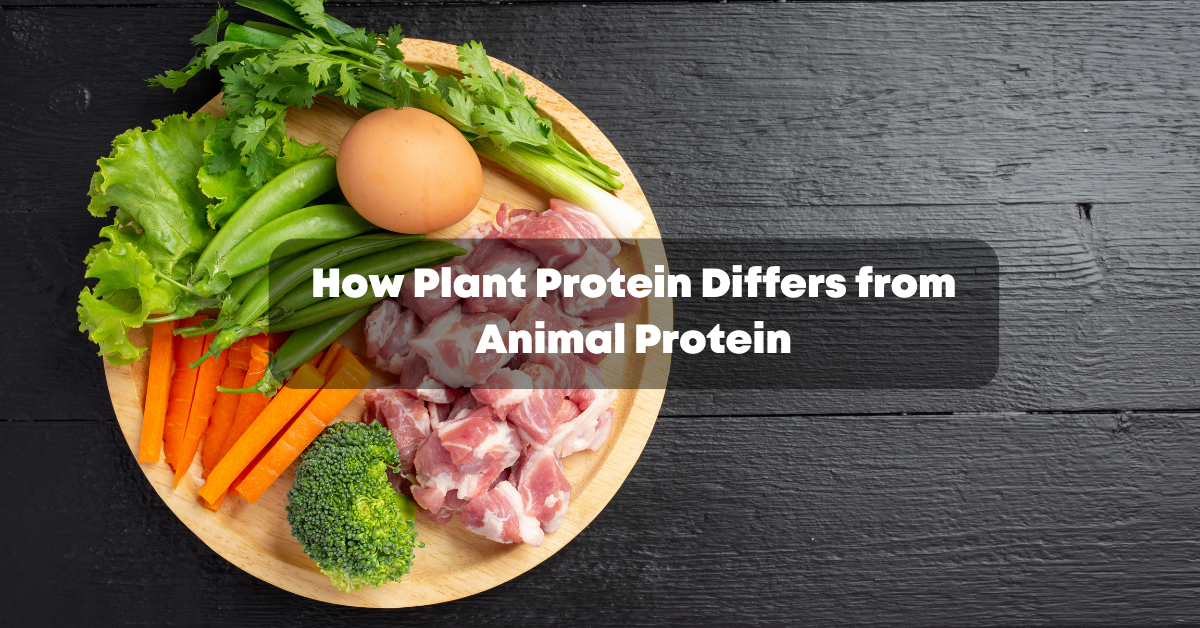How Plant Protein Differs from Animal Protein
You should consume enough protein each day for good health. Critical activities include immunological function, cellular functions, cell structure, and growth are all dependent on protein. Consequently, getting adequate protein each day is crucial.
Numerous dietary sources, including both plants and animals, include protein. Some observers argue that it is irrelevant whether the protein comes from plants or animals. Some people contend that one kind of protein is better than the other.
We examine the differences among animal and plant protein in this article. Additionally, we look at the implications for health, explain which is ideal for bodybuilding, and list the finest sources for each protein.
Why do we need Protein?
The body has protein in every cell, including the muscles, organs, bones, skin, and hair. Protein must be obtained from the food because the body cannot store it like it other macronutrients.
Amino acids make up proteins. For a person’s body to operate properly, all 22 different forms of amino acids must be present in balance. Nine of these acids, known as essential amino acids, are unable to be produced by the body. A sort of food that has all nine is referred to as a complete protein source.
Having the appropriate ratio of amino acids in your diet will help you gain muscle and recover from exercise more rapidly. Anyone who wants to make sure their diet is healthy should be clear on the difference between plant and animal proteins.
Plant vs Animal Protein
The composition of amino acids is one of the primary differences between plant and animal proteins. The building components of protein are amino acids. The proteins in food are broken down into amino acids by the body during digestion.
Various amino acids may be required by the organism at various periods. Many individuals think that the diet should comprise sources of protein that are complete, meaning they include all 9 essential amino acids.
Complete protein sources come from certain animal products, including:
- White-meat poultry
- Fatty fish like salmon
- Pork
- Lean or extra-lean cuts of beef
- Eggs and egg whites
- Low-fat Greek yoghourt
The majority of plant proteins sources are incomplete, meaning they lack at least one of the necessary amino acids. Quinoa and buckwheat, two plant-based foods, are complete supplies of protein.
Vegetarians and vegans should diversify their protein sources to make sure they are getting all the necessary amino acids. Additionally, bear in mind that the body may require more time to digest and utilise some plant protein sources.
Examples of plant-based diets high in protein include:
- lentils
- nuts
- legumes
- soy
- hemp
- brown rice
- Peas
Getting all the required amino acids on an entirely plant-based diet is still doable, it may just need a bit more work because plant foods contain various levels of different amino acids.
You may make sure that you’re getting all the necessary amino acids in your diet by consuming a diversified diet and mixing complementary plant proteins, such as vegan plant protein powder.
Which is Healthier?
The additional nutrients that the meals supply should be taken into consideration when deciding either plant and animal sources of protein.
Protein rich foods can have a wide variety of nutritional characteristics. While some plant-based diets lack heme iron and vitamin B-12, some animal protein sources can have substantial levels of these nutrients.
But on the other hand, sources of animal protein lack phytonutrients, which are nutrients particular to plants, and some antioxidants. Compared to vegan protein sources, animal products have more saturated fat and cholesterol. For these reasons, one might choose to refrain from consuming animal products.
Blood sugar control may also be enhanced by plant-based diets. Numerous observational studies have demonstrated the value of these diets in the prevention and management of type 2 diabetes.
Fibre is still another crucial element. Only foods derived from plants are rich in fibre, which supports a healthy digestive system. A person’s general health may be enhanced by increasing their intake of plant protein.
However, researchers pointed out that they only discovered the connection between animal protein and cardiovascular disease in those with at minimum one lifestyle-related risk factor, such as smoking, binge drinking, or being overweight or obese.
The findings also suggested that increasing your intake of plant proteins may help lower this risk as well as others. Eating a variety of foods is typically the best approach to satisfy a person’s nutritional demands.
Although these findings are encouraging, they do not show that these health advantages derive from cutting out sources of animal protein; rather, the advantages may come from consuming more nutrient-dense plant foods.
Which is good for Muscle Building?
Athletes and those who want to build muscle and speed up the recovery process from exercise frequently pay special attention to their protein intake. After an intense workout, protein aids in muscle repair and growth.
Whey protein is a popular choice among athletes for muscular growth. Whey may have an advantage over other forms of protein including meat, eggs, and vegetables due to this type of protein’s ease of digestion and absorption by the body.
A variety of plant-derived proteins are often advised to be consumed after exercise. The body may receive a variety of amino acids from this.
Which is the best Protein?
Instead than concentrating on the type of protein, it may be more crucial to just consume enough of it.
One research study discovered that eating more protein than is usual increased indicators of healthy muscles, including lean mass and quadriceps strength. The researchers found that the quantity of protein mattered more than the kind.
However, some protein sources could be superior for overall health. For instance, compared to red meat, fish & white meat often have lower fat content.
The Bottomline
Numerous factors must be taken into account for many people when deciding between animal and vegan plant protein powder.
It could be best to concentrate on consuming a range of meals rather than just one kind of protein. This can guarantee that a person consumes a balanced diet of amino acids and other essential nutrients.
Anyone with particular queries regarding the sources and needs of protein should consult a nutritionist.
Author’s Bio:
I am Meera Sharma, a post-graduate in Health and Nutrition, and an inquisitive person who loves writing. I’m working for getveganway and my forte is digital marketing and everything that has to do with phones and screens.


